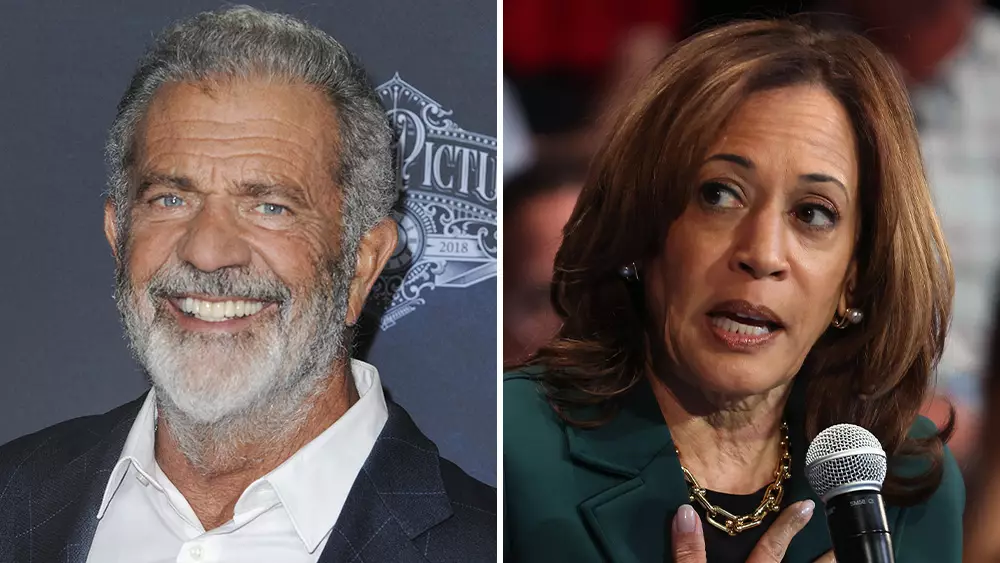Recently, actor Andrew Garfield expressed support for Mel Gibson, praising the director’s personal growth and “beautiful healing with himself” over the years. Such sentiments are not uncommon in Hollywood, where public figures often champion one another for their supposed redemption arcs. However, Garfield’s admiration for Gibson may warrant reconsideration after Gibson’s latest remarks regarding Vice President Kamala Harris.
During an encounter at the Los Angeles airport, Gibson commented on Harris, stating she has the “IQ of a fence post.” This crude description raises red flags and highlights the disconnect between personal recovery and professional behavior. Garfield’s earlier praises of Gibson seem starkly misplaced when considering such derogatory language, which echoes a broader dialogue about misogyny and intelligence attacks in contemporary politics.
Gibson’s recent statements at the airport did not stop at merely disparaging Harris’s intelligence. The actor also announced his support for Donald Trump, emphasizing the belief that Harris’s victory in the tumultuous 2020 election would be detrimental for the country. He criticized her track record as “miserable” and “appalling,” reflecting a narrative often pushed by far-right supporters of Trump. Gibson’s rhetoric is not an isolated incident; it follows a concerning trajectory of derogatory remarks and a negative portrayal of political opponents, particularly women in powerful positions.
His comments deserve scrutiny not just due to their content, but also because they fit within a larger pattern of toxic masculinity that often seeks to undermine women’s intelligence and authority in politics.
The irony surrounding Gibson’s critique of Harris is accentuated by his history of controversial and offensive remarks. This is not the first time Gibson has drawn criticism for his words. Back in 2006, he was arrested for DUI and subsequently launched into a tirade filled with antisemitic remarks. Those comments have haunted him over the years, even as he attempted to make amends through various apologies and claims of personal change. However, the inconsistencies between his past and present behavior raise serious questions about his ability to genuinely evolve as a person.
Moreover, the resurfacing of Gibson’s previous behavior, including offensive remarks made toward women and racist comments directed at marginalized communities, suggests that any claims of “healing” may be superficial. In light of his comments regarding Harris, one must ponder whether Gibson is indeed capable of genuine introspection and personal growth, or if he is simply rebranding himself to gain favor with select groups.
The effects of Gibson’s remarks extend beyond the individual or political rivalries; they tap into a societal issue surrounding how public figures engage in political discourse. The language that Gibson employs, as well as the language used by Trump and their cohorts, fosters a culture of ridicule rather than constructive dialogue. Demeaning comments about intelligence often serve to overshadow critical discussion about policies and governance, ultimately undermining the very democratic values that allow for differing opinions.
Furthermore, such rhetoric can perpetuate harmful stereotypes about women, particularly women of color in leadership roles. Harris’s experience as vice president has already been marred by instances of overt racism and sexism, and Gibson’s words only add another layer to a narrative that seeks to diminish her voice.
As we navigate through a contentious political landscape, the need for accountability grows ever more crucial. Public figures who wield influence have a responsibility to conduct themselves with decorum. While personal stories of healing and redemption can be impactful, they should not serve as shields for inappropriate or harmful behavior. Both the public and the industry must emphasize the importance of critiquing not only actions but also the language that shapes our collective discourse.
Conversations about Mel Gibson shed light on the complexities of personal growth amidst a backdrop of deeply problematic behavior. While some may argue that past transgressions should be set aside in favor of present accolades, the reality is that one’s words carry weight, especially in positions of visibility and influence. As citizens and consumers of media, it is crucial to hold individuals accountable and demand a higher standard of dialogue in political discussions.
